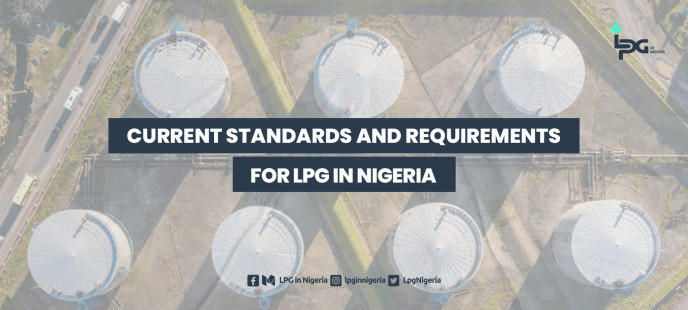- 9020
- 1
Sharing Ideas and Updates on LPG in Nigeria and related information to enable effective collaboration within the LPG Value Chain
Current Standards And Requirements For LPG In Nigeria - LPG REGULATIONS PART 2

As the demand for Liquefied Petroleum Gas (LPG) grows in Nigeria, ensuring compliance with current standards and regulations is crucial for the industry’s safety, efficiency, and sustainability. From minimum registration requirements to LPG specifications and safety guidelines, this post explores the critical standards that govern LPG operations in Nigeria.
Minimum Registration Requirements
Operating within the LPG sector in Nigeria requires businesses to meet specific registration and licensing requirements. These guidelines, set by regulatory bodies such as the Nigerian Midstream and Downstream Petroleum Regulatory Authority – NMDPRA, are designed to ensure that only qualified companies or businesses participate in the industry.
Key Registration Requirements:
Corporate Registration:
Businesses must register with the Corporate Affairs Commission (CAC) and provide necessary legal documentation, such as a Certificate of Incorporation, Memorandum, and Articles of Association.
Permit to Operate:
The NMDPRA requires operators to obtain permits for various aspects of LPG business, including storage, transportation, retailing, and distribution.
Environmental Impact Assessment (EIA):
LPG facilities must conduct an EIA to evaluate the environmental implications of their operations and obtain necessary clearance from the Federal Ministry of Environment.
Safety Certification:
Companies are required to provide evidence of compliance with safety standards, including the presence of fire suppression systems, regular safety audits, and training for personnel.
Insurance Coverage:
Comprehensive insurance covering liabilities for potential accidents is mandatory for all LPG operators.
LPG Specifications: Butane and Propane
LPG in Nigeria typically consists of a mixture of butane and propane, two hydrocarbon gases with distinct properties. The proportion of these gases determines the performance and suitability of LPG for specific applications, such as cooking, heating, or industrial use.
Key Specifications:
Composition: Nigerian standards specify acceptable ranges of butane and propane mixtures to meet safety, efficiency, and performance benchmarks. For domestic use, a higher proportion of butane is preferred due to its lower pressure and suitability for warm climates.
Impurity Limits: LPG must meet strict quality guidelines that limit impurities such as sulfur, water, or other contaminants that can damage equipment or pose safety risks.
Odorization: To ensure safety, LPG must be odorized with a chemical additive (usually ethyl mercaptan) to aid leak detection.
Storage and Transportation Standards
The safe storage and transportation of LPG are critical in preventing accidents and ensuring efficient delivery to consumers.
Storage Standards:
LPG storage facilities must adhere to guidelines on tank design, installation, and maintenance.
Facilities must maintain a safe distance from residential and commercial areas, as specified by NMDPRA guidelines.
Regular inspections and re-certification of storage tanks are mandatory to ensure structural integrity.
Transportation Standards:
LPG tankers must meet safety standards for pressure vessels, including proper labeling and certification.
Drivers and transport personnel must undergo specialized training in handling LPG.
Vehicles must be equipped with emergency kits and fire suppression systems.
Other Critical Standards
Cylinder Requalification and Certification:
LPG cylinders in Nigeria must be requalified every five years, with a maximum lifespan of 15 years. Cylinders are inspected for structural integrity, leakage, and valve performance before being certified for continued use.
Retail and Distribution Guidelines:
LPG retail outlets must be licensed by the NMDPRA and adhere to zoning regulations to ensure safe operations.
Outlets must provide consumer education on safe cylinder handling and storage.
Safety Practices:
Operators are required to conduct regular safety drills and have adequate firefighting equipment on-site.
Public awareness campaigns on LPG safety are encouraged to reduce risks at the consumer level.
The Role of Regulatory Bodies
The regulatory framework for LPG in Nigeria is driven by collaboration among various agencies, including:
NMDPRA: Oversees licensing, safety standards, and compliance in the midstream and downstream sectors.
Standards Organisation of Nigeria (SON): Develops and enforces technical standards for LPG equipment and operations.
Federal Ministry of Environment: Ensures environmental compliance through EIA approvals.
The success of Nigeria’s LPG industry hinges on strict adherence to established standards and requirements. As the country continues its transition to cleaner energy, compliance with these regulations will not only ensure safety but also build consumer confidence and attract investment.
By understanding and meeting the standards for registration, LPG specifications, and operational safety, stakeholders in the industry can contribute to a robust and sustainable energy sector in Nigeria.
In other news, are you visiting our Marketplace?
Make sure to do so if you are not, it can help your business.
















Kenneth Otaru
02 June 2025 - 11:50amGood piece on LPG. Kindly include other agencies whose input is required before certification is complete i.e. Weights and measure, Fire service just to mention a few.
Reply